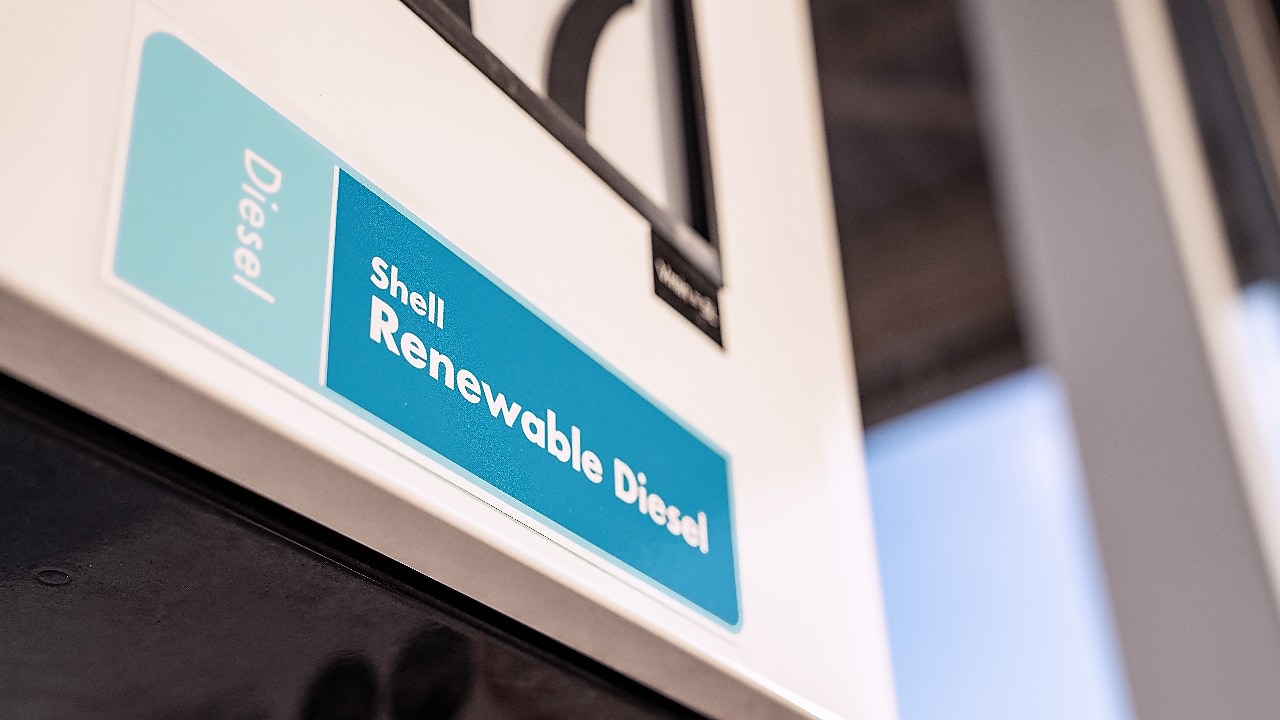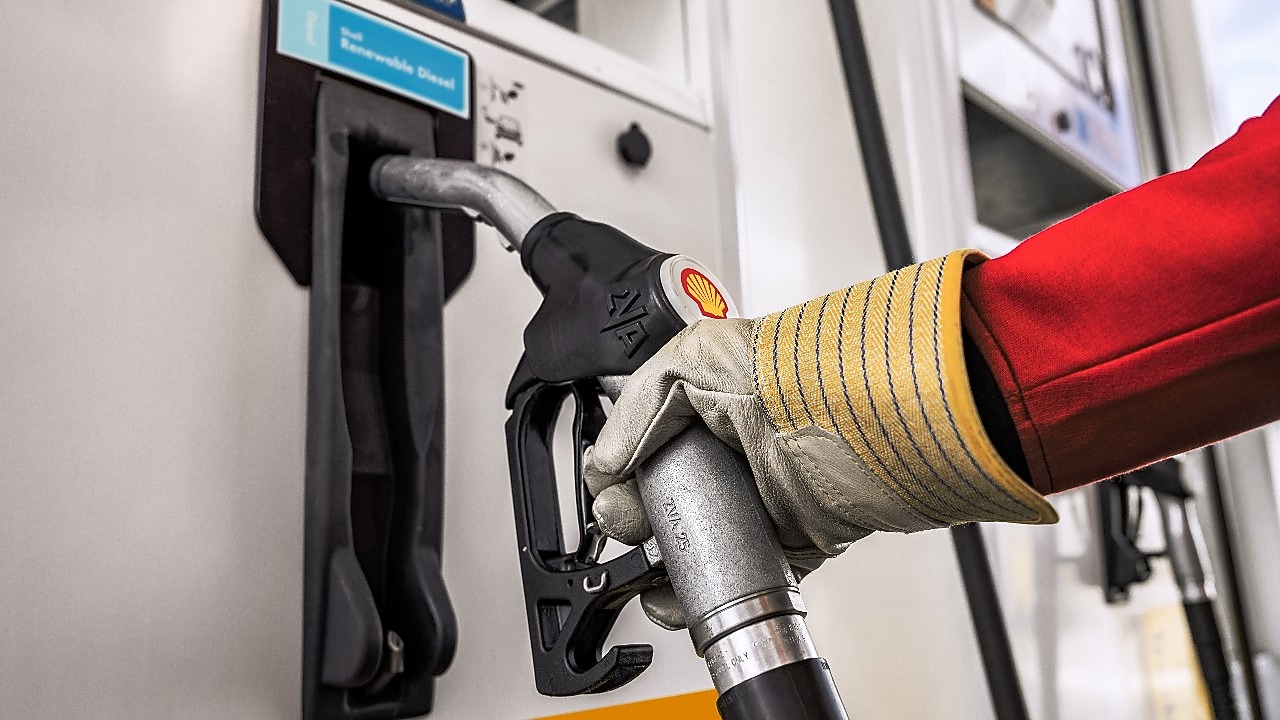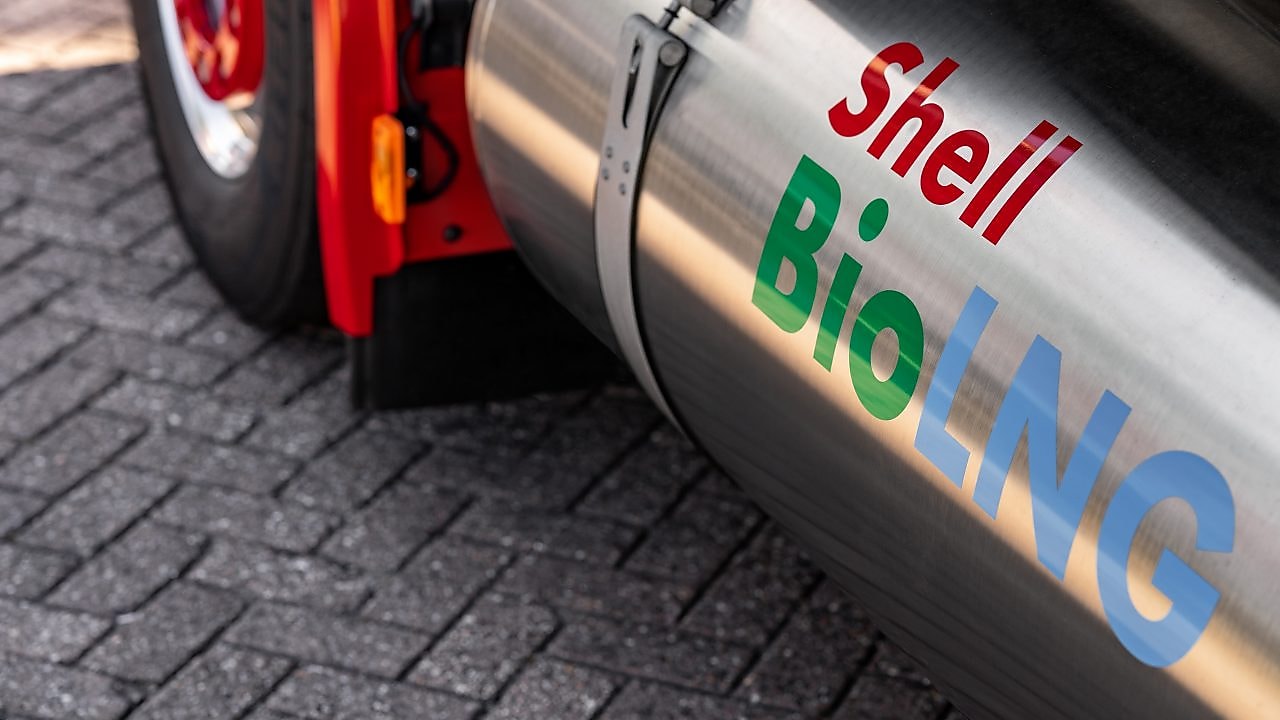Shell Renewable Diesel
Seamlessly integrate this renewable fuel into your existing diesel engine fleet¹ to help decarbonise your operations.
In Europe, Shell Renewable Diesel, offers up to 90% less CO2e² emissions compared to B7 diesel³ on a life cycle basis.⁴
Shell Renewable Diesel, sometimes referred to as HVO in the market, is a viable low-carbon alternative to power your fleet and your decarbonisation goals. It is derived from waste or residue non-food and non-feed feedstock5, and compatible with most existing diesel engines1. It is also free of unwanted components such as sulphur, metals and aromatics.

Fuel your fleet with a range of benefits
Simplified implementation
The compatibility of Shell Renewable Diesel with existing diesel infrastructure and engines means it can be used as a drop-in alternative, with no new vehicles or modifications needed. This allows for a seamless integration into current operations, minimising downtime and supporting uninterrupted fleet performance1.
Refuelling time
Designed to reduce refuelling time and allow a full tank refill6.
Cold start
Excellent low temperature combustion performance7.
Engine noise reduction
Shell Renewable Diesel can enhance your driving experience by reducing engine noise8.
Building Europe’s biofuel future

Shell’s target is to become a net zero emissions⁹ energy business by 2050.
By offering customers a broad choice of low-carbon solutions, we can help our customers decarbonise, as well as support energy security during this transition. These products are an effective way to help decarbonise customers for whom energy density in fuels is key.

Disclaimers
Disclaimers
1. When switching from diesel. Based on Shell’s operability studies and market experience to date. Vehicle handbook and/or label at the fuel tank socket must be checked for OEM approval.
2. Between 80%-90% CO₂e. CO₂e (carbon dioxide equivalent) refers to CO₂, CH₄, N₂O. Applies for Austria, Belgium, Czech Republic, France, Germany and The Netherlands.
3. The reduced CO₂e emissions are calculated by comparing to a GHG baseline intensity of 90.2 gCO₂e/MJ on a Well-to-Wheel basis, which is representative of a European Union market B7 diesel. The carbon intensity of the B7 diesel is calculated by Shell using emission factors from the JEC Well-to-Tank report v5. (Link: European Commission, Joint Research Centre, Prussi, M., Yugo, M., De Prada, L., et al., JEC well-to-tank report V5: JEC well-to-wheels analysis: well-to-wheels analysis of future automotive fuels and powertrains in the European context, Publications Office, 2020, https://data.europa.eu/doi/10.2760/959137).
4. The full life cycle assessment of a product's CO₂e emissions includes emissions associated with feedstock production, feedstock transport, fuel production, fuel transportation and distribution as well as end use and/or combustion.
5. Shell Renewable Diesel is derived from allocated waste or residue non-food and non-feed biofuel feedstocks compliant with the RED II directive including but not limited to feedstocks listed under the Annex IX-A and IX-B [Link].
6. Compared to B7
7. Compared to B7 diesel. Amount of improvement depends on engine type and ambient conditions. Not applicable for passenger cars.
8. Actual effects and benefits may vary according to vehicle type, vehicle condition and driving style. Compared to B7 diesel. Not applicable for passenger cars.
9. Scopes 1, 2, and 3. Cautionary note | Shell Global.
How can we help?
Cautionary note
Cautionary note
The companies in which Shell plc directly and indirectly owns investments are separate legal entities. In this content “Shell”, “Shell Group” and “Group” are sometimes used for convenience to reference Shell plc and its subsidiaries in general. Likewise, the words “we”, “us” and “our” are also used to refer to Shell plc and its subsidiaries in general or to those who work for them. These terms are also used where no useful purpose is served by identifying the particular entity or entities. ‘‘Subsidiaries’’, “Shell subsidiaries” and “Shell companies” as used in this content refer to entities over which Shell plc either directly or indirectly has control. The terms “joint venture”, “joint operations”, “joint arrangements”, and “associates” may also be used to refer to a commercial arrangement in which Shell has a direct or indirect ownership interest with one or more parties. The term “Shell interest” is used for convenience to indicate the direct and/or indirect ownership interest held by Shell in an entity or unincorporated joint arrangement, after exclusion of all third-party interest.
Forward-Looking statements
This content contains forward-looking statements (within the meaning of the U.S. Private Securities Litigation Reform Act of 1995) concerning the financial condition, results of operations and businesses of Shell. All statements other than statements of historical fact are, or may be deemed to be, forward-looking statements. Forward-looking statements are statements of future expectations that are based on management’s current expectations and assumptions and involve known and unknown risks and uncertainties that could cause actual results, performance or events to differ materially from those expressed or implied in these statements. Forward-looking statements include, among other things, statements concerning the potential exposure of Shell to market risks and statements expressing management’s expectations, beliefs, estimates, forecasts, projections and assumptions. These forward-looking statements are identified by their use of terms and phrases such as “aim”; “ambition”; ‘‘anticipate’’; “aspire”, “aspiration”, ‘‘believe’’; “commit”; “commitment”; ‘‘could’’; “desire”; ‘‘estimate’’; ‘‘expect’’; ‘‘goals’’; ‘‘intend’’; ‘‘may’’; “milestones”; ‘‘objectives’’; ‘‘outlook’’; ‘‘plan’’; ‘‘probably’’; ‘‘project’’; ‘‘risks’’; “schedule”; ‘‘seek’’; ‘‘should’’; ‘‘target’’; “vision”; ‘‘will’’; “would” and similar terms and phrases. There are a number of factors that could affect the future operations of Shell and could cause those results to differ materially from those expressed in the forward-looking statements included in this content, including (without limitation): (a) price fluctuations in crude oil and natural gas; (b) changes in demand for Shell’s products; (c) currency fluctuations; (d) drilling and production results; (e) reserves estimates; (f) loss of market share and industry competition; (g) environmental and physical risks, including climate change; (h) risks associated with the identification of suitable potential acquisition properties and targets, and successful negotiation and completion of such transactions; (i) the risk of doing business in developing countries and countries subject to international sanctions; (j) legislative, judicial, fiscal and regulatory developments including tariffs and regulatory measures addressing climate change; (k) economic and financial market conditions in various countries and regions; (l) political risks, including the risks of expropriation and renegotiation of the terms of contracts with governmental entities, delays or advancements in the approval of projects and delays in the reimbursement for shared costs; (m) risks associated with the impact of pandemics, regional conflicts, such as the Russia-Ukraine war and the conflict in the Middle East, and a significant cyber security, data privacy or IT incident; (n) the pace of the energy transition; and (o) changes in trading conditions. No assurance is provided that future dividend payments will match or exceed previous dividend payments. All forward-looking statements contained in this content are expressly qualified in their entirety by the cautionary statements contained or referred to in this section. Readers should not place undue reliance on forward-looking statements. Additional risk factors that may affect future results are contained in Shell plc’s Form 20-F and amendment thereto for the year ended December 31, 2024 (available at www.shell.com/investors/news-and-filings/sec-filings.html and www.sec.gov). These risk factors also expressly qualify all forward-looking statements contained in this content and should be considered by the reader. Each forward-looking statement speaks only as of the date of this content. Neither Shell plc nor any of its subsidiaries undertake any obligation to publicly update or revise any forward-looking statement as a result of new information, future events or other information. In light of these risks, results could differ materially from those stated, implied or inferred from the forward-looking statements contained in this content.
Shell’s net carbon intensity
Also, in this content we may refer to Shell’s “net carbon intensity” (NCI), which includes Shell’s carbon emissions from the production of our energy products, our suppliers’ carbon emissions in supplying energy for that production and our customers’ carbon emissions associated with their use of the energy products we sell. Shell’s NCI also includes the emissions associated with the production and use of energy products produced by others which Shell purchases for resale. Shell only controls its own emissions. The use of the terms Shell’s “net carbon intensity” or NCI is for convenience only and not intended to suggest these emissions are those of Shell plc or its subsidiaries.
Shell’s net-zero emissions target
Shell’s operating plan and outlook are forecasted for a three-year period and ten-year period, respectively, and are updated every year. They reflect the current economic environment and what we can reasonably expect to see over the next three and ten years. Accordingly, the outlook reflects our Scope 1, Scope 2 and NCI targets over the next ten years. However, Shell’s operating plan and outlook cannot reflect our 2050 net-zero emissions target, as this target is outside our planning period. Such future operating plans and outlooks could include changes to our portfolio, efficiency improvements and the use of carbon capture and storage and carbon credits. In the future, as society moves towards net-zero emissions, we expect Shell’s operating plans and outlooks to reflect this movement. However, if society is not net zero in 2050, as of today, there would be significant risk that Shell may not meet this target.
Forward-Looking non-GAAP measures
This content may contain certain forward-looking non-GAAP measures such as adjusted earnings and divestments. We are unable to provide a reconciliation of these forward-looking non-GAAP measures to the most comparable GAAP financial measures because certain information needed to reconcile those non-GAAP measures to the most comparable GAAP financial measures is dependent on future events some of which are outside the control of Shell, such as oil and gas prices, interest rates and exchange rates. Moreover, estimating such GAAP measures with the required precision necessary to provide a meaningful reconciliation is extremely difficult and could not be accomplished without unreasonable effort. Non-GAAP measures in respect of future periods which cannot be reconciled to the most comparable GAAP financial measure are calculated in a manner which is consistent with the accounting policies applied in Shell plc’s consolidated financial statements.
The contents of websites referred to in this content do not form part of this content.
We may have used certain terms, such as resources, in this content that the United States Securities and Exchange Commission (SEC) strictly prohibits us from including in our filings with the SEC. Investors are urged to consider closely the disclosure in our Form 20-F and amendment thereto, File No 1-32575, available on the SEC website www.sec.gov.


